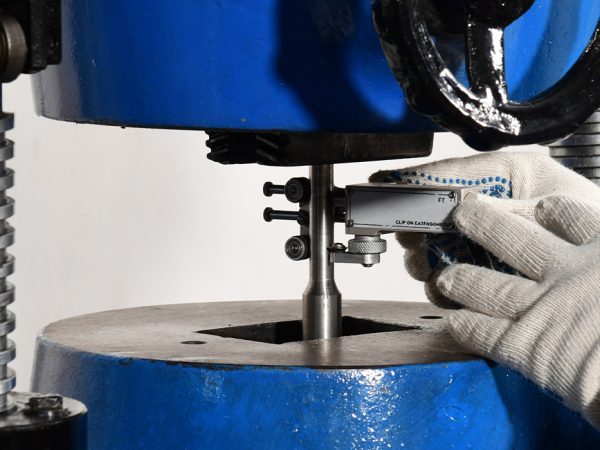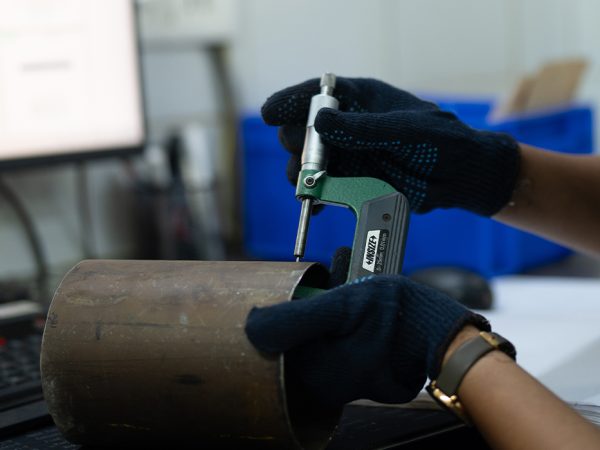Failure and Root Cause Analysis is one of the most critical processes in engineering and industrial operations. By investigating why components fail, industries can prevent costly breakdowns, enhance safety, and improve overall efficiency. At TCR Advanced Engineering, decades of expertise and over 1800+ assignments have helped industries across power generation, oil and gas, manufacturing, aerospace, and more to implement effective Failure Investigation practices and eliminate recurring issues.
TCR prides itself for its deep sectoral knowledge and has compiled best practices from over 1800 failure investigation assignments. These success stories include major projects in manufacturing and metallurgical failures on ASME boilers, pressure vessels, gas turbine engine components, oil and gas transmission pipelines, food processing equipment, heat exchangers, medical supplies, refineries, petrochemical plants, aircraft/aerospace, offshore structures, industrial machinery, weldments and ships.
This blog explores the definition, methods, and levels of Failure and Root Cause Analysis (RCA and RCFA), the difference between approaches, and how these investigations apply across diverse industries. We will also look at real-world examples such as Boilers Tube Failure Investigations, Shaft failure investigation, Heater tube failure investigation, Heat Exchanger Inspection, and turbine-related failures.
What is Failure and Root Cause Analysis?
At its core, Failure and Root Cause Analysis involves the systematic study of why a component or system failed, identifying contributing factors, and recommending corrective measures to avoid recurrence.
- Failure Analysis (FA): Focuses on the “what” – understanding what happened to the material or component and identifying the failure mode.
- Root Cause Analysis (RCA): Goes deeper into the “why” – analyzing the underlying cause behind the event, not just the symptoms.
- Root Cause Failure Analysis (RCFA): Combines both methods and focuses on technical, human, and systemic causes of failures.
This multi-level approach ensures that corrective measures address not only the visible defect but also the hidden causes that could trigger repeated breakdowns.

Three Levels of Root Cause Analysis
A complete Root Cause Analysis (RCA) often involves three levels:
1. Physical/Technical Analysis: Identifying material defects, mechanical issues, corrosion, or thermal stresses that caused damage.
2. Human/Process Analysis: Studying whether operational errors, poor maintenance practices, or training gaps contributed to the failure.
3. Systemic/Organizational Analysis: Looking into design flaws, procurement issues, or management systems that enabled the failure.
This layered investigation provides industries with a comprehensive strategy to prevent future failures.
Evaluation Sequence for Conducting Failure Analysis
TCR Advanced Engineering follows a structured approach for every Failure Investigation:
1. Collection of Background Data – service history, operating conditions, and failure symptoms.
2. Preliminary Examination – visual inspection of failed parts.
3. Metallurgical and Microscopic Analysis – including electron microscopy, weld examination, and grain size determination.
4. Chemical Analysis – testing surface corrosion products, deposits, and coatings.
5. Fracture Mechanics Study – simulating real-life stresses to replicate failures.
6. Testing Alternatives – evaluating new products or processes that could enhance performance.
7. On-site Consulting – expert teams assess live conditions and advise on corrective measures.
8. Failure Investigation Report – documenting findings, service conditions, failure mechanisms, and recommendations.
This method ensures accuracy and prevents similar failures from recurring.
Industries We Serve with Failure and Root Cause Analysis
TCR has built unmatched expertise across diverse sectors, delivering tailored Failure and Root Cause Analysis solutions.
1. Power Generation Industry
High-temperature and high-pressure conditions make power plants vulnerable to issues like Boiler Tube Failure investigation, turbine blade fatigue, and pressure vessel cracks. Through advanced techniques like Boilers Tube Failure Investigations and Failure investigation of steam turbine, TCR helps ensure uninterrupted power supply and plant safety.
2. Fertilizer Industry
Equipment in fertilizer plants often suffers from corrosion, scaling, and cracking due to aggressive chemical environments. Heat Exchanger Inspection and Heater tube failure investigation play a vital role in maintaining production efficiency.
3. Chemical and Petrochemical Industry
From refineries to petrochemical plants, equipment failure can cause significant downtime and hazards. Failure analysis in this sector includes Reformer tube failure investigation and corrosion studies of pipelines and pressure vessels.
4. Oil & Gas
One of the most safety-critical industries, oil and gas relies on Failure and Root Cause Analysis for pipeline integrity, offshore structures, and drilling equipment. Investigations such as Failure investigation of Gas turbine and weld evaluations help maintain operational excellence.
5. Insurance Sector
Insurance companies often rely on Failure Investigation Reports to validate claims, determine liability, and recommend preventive measures. By examining incidents like Shaft failure investigation or structural collapses, insurers can make informed decisions.
6. EPC (Engineering Procurement & Construction)
EPC companies engaged in large-scale projects benefit from early-stage Root Cause Analysis during construction and commissioning. Identifying defects early reduces rework, saves costs, and enhances reliability.
7. Pharmaceutical Industry
Precision equipment and hygiene-critical processes in pharma require strict reliability. Failures in heat exchangers, pumps, or sterile systems demand thorough Failure analysis and metallurgical evaluation to avoid production losses.
8. Fabrication Industry
Welding defects, material inconsistencies, and process failures are common in fabrication. Detailed Failure Investigation ensures better quality control and reduces warranty claims.
9. Manufacturing Industry
From heavy machinery to consumer goods, Failure and Root Cause Analysis prevents breakdowns, improves productivity, and extends equipment life. Common cases include Shaft failure investigation and metallurgical defects in parts.
10. Automobile Industry
Automotive failures – from engine components to structural parts – are critical to safety and brand reputation. Through Failure investigation of Boiler tube, stress testing, and metallurgical studies, manufacturers can improve product reliability and avoid costly recalls.
Real-World Failure Investigations
TCR Advanced Engineering has successfully completed thousands of Failure Investigations, including:
- Boilers Tube Failure Investigations to analyze overheating, scaling, and creep damage.
- Shaft failure investigation due to fatigue, improper design, or lubrication issues.
- Heater tube failure investigation caused by corrosion and thermal stress.
- Heat Exchanger Inspection to detect cracks, scaling, or deposition issues.
- Reformer tube failure investigation in petrochemical plants for operational safety.
- Failure investigation of steam turbine and Failure investigation of Gas turbine to study creep, fatigue, and metallurgical defects.
- Failure investigation of Boiler tubes for power plants to ensure plant reliability.
These studies not only resolve the immediate breakdown but also provide actionable recommendations for future prevention.
Failure Investigation Report – Turning Analysis into Action
The Failure Investigation Report is the most important outcome of any analysis. It represents the shift from simply identifying the failure to eliminating its recurrence. A standard report includes:
- Description of the failed component
- Service conditions at the time of failure
- Prior service and manufacturing history
- Mechanical and metallurgical findings
- Failure mechanism summary
- Root Cause Analysis conclusions
- Recommendations for prevention
This ensures industries gain practical solutions that can be implemented in operations, design improvements, or maintenance programs.
Advanced Tools and Techniques for Modern Analysis
To deliver precise results, TCR relies on state-of-the-art equipment:
Metallurgical Optical Microscope with Image Analysis
This tool helps study fracture surfaces at low magnification to identify initial failure patterns. The integrated image analysis system ensures accurate documentation and selection of regions for deeper investigation.
Scanning Electron Microscope with EDAX
A SEM combined with EDAX allows high-magnification imaging and elemental analysis. It is vital for detecting micro-cracks, corrosion mechanisms, and chemical composition of localized failure areas.
Stress Analyzer
The stress analyzer detects residual and operational stresses within metals. Understanding these stress levels helps determine whether fatigue, overload, or thermal stress contributed to the failure.
Mechanical & Chemical Testing Equipment
These tools test the strength, hardness, and chemical composition of materials. They confirm whether the component met design standards and whether corrosion or material degradation occurred.
Dilatometer
A dilatometer measures changes in volume and dimensions during heating or cooling. This reveals phase transformations and thermal behavior critical to high-temperature failure investigations.
Sample Preparation Tools
Equipment like diamond saw cutters, polishing units, and micro-hardness testers prepare samples without altering their structure. Proper preparation ensures accurate metallurgical and microscopic examination.
With these tools, every Failure analysis is conducted with scientific accuracy and documented evidence.
Why Failure and Root Cause Analysis Matters
Failures can cost industries millions in downtime, safety hazards, and reputation loss. Through structured Failure and Root Cause Analysis, companies can:
- Prevent repeat failures.
- Enhance safety and compliance.
- Optimize maintenance practices.
- Improve reliability of critical assets.
- Support insurance and legal claims with scientific reports.
By combining Boilers Tube Failure Investigations, turbine inspections, and advanced metallurgical studies, TCR provides actionable insights that industries can trust.
FAQs
1. Why is Failure and Root Cause Analysis important for my industry?
Failure and Root Cause Analysis helps identify why a component or system failed and provides actionable solutions. This prevents costly downtime, improves safety, and increases reliability across industries like power, oil & gas, manufacturing, and more.
2. How is Failure Analysis different from Root Cause Analysis?
Failure Analysis focuses on examining how and where the failure occurred. Root Cause Analysis digs deeper to identify the underlying reason behind the failure. Together, they provide a complete picture for long-term solutions.
3. What industries benefit the most from Failure and Root Cause Analysis?
Industries such as power generation, petrochemicals, oil & gas, automotive, pharmaceuticals, EPC, and insurance benefit significantly. It helps improve safety, efficiency, and regulatory compliance.
4. How long does a typical Failure Investigation take?
The duration depends on the complexity of the failure. Some investigations take a few days, while detailed metallurgical studies and simulations may take weeks to ensure accurate results.
5. What information do I need to provide before starting a Failure Investigation?
Clients should share background data, service history, operating conditions, and any records of previous failures. This information speeds up analysis and ensures precise conclusions.
Conclusion
Failure and Root Cause Analysis is not just about fixing a broken component – it is about ensuring reliability, safety, and performance for the future. From Boiler Tube Failure investigation to Heat Exchanger Inspection, from turbines to shafts, every Failure Investigation Report paves the way for better engineering practices.
With its proven track record across power, oil & gas, manufacturing, and more, TCR Advanced Engineering continues to set benchmarks in Failure analysis and prevention. For industries seeking reliability and safety, partnering with experts in Failure and Root Cause Analysis is the ultimate step towards operational excellence.







